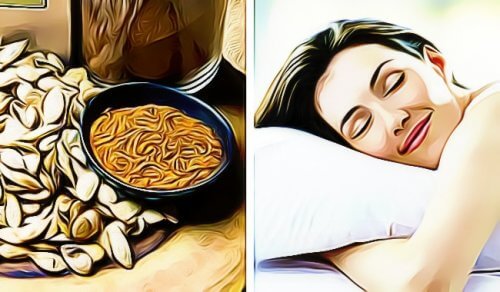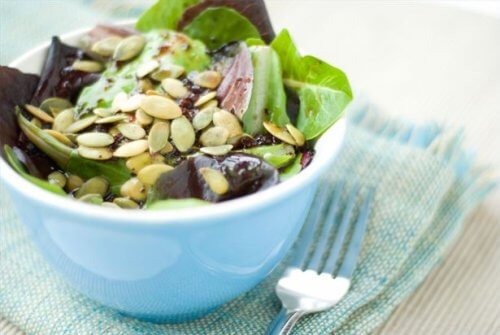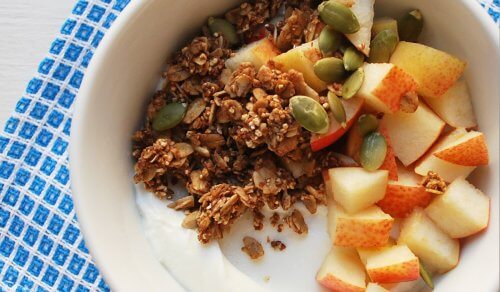Find Out How Pumpkin Seeds Can Help You Sleep Better


Written and verified by the doctor Gilberto Adaulfo Sánchez Abreu
Pumpkin seeds may be small, but they are so chock-full of nutrients that throwing them away would be a true shame.
Next time you go to cook pumpkin, set them aside for later: they contain significant amounts of healthy fats, magnesium, and zinc, which are good for your bones.
Now there’s also one thing not everybody knows about them: pumpkin seeds are great for helping you get a good night’s sleep.
Some people like them as a tasty snack. All you have to do is toast them to get a healthy, delicious way to hold you over until lunch.
However, if you get in the habit of eating them at dinner, you’ll notice the difference in your sleep.
They’re easy to make, go with all kinds of other foods, and will help you fall asleep after a stressful day of work.
Let’s take a look at how they can help you sleep better.
Pumpkin Seeds, a Natural Source of Tryptophan

You may already know that certain foods have the ability to encourage biochemical changes in your body to move it towards a state of relaxation.
These seeds are one of them, because they’re an excellent source of tryptophan.
Tryptophan is an amino acid that your body converts into serotonin and induces your brain to produce melatonin, the so-called “sleep hormone.”
Something as enjoyable as having some pumpkin seeds a few hours before bed along with a natural source of carbohydrates can double the amount of tryptophan in your body.
It’s amazing. Try it!
Find out 7 Ways to Start Your Day Well and Fight Stress and Anxiety”
Other Incredible Benefits of Pumpkin Seeds
Here’s another interesting fact. All it takes is a quarter cup of pumpkin seeds to get half your daily recommended amount of magnesium. This mineral is necessary for sending nerve impulses to your heart, protecting your bone health, and regulating your blood pressure.
Pumpkin seeds are also very good for women beginning menopause. The seeds are rich in natural phytoestrogens, thus helping with hot flashes, headaches, and joint pain.
Plus, when it comes to natural sources of omega 3’s, nuts are always a good choice.
And last but not least, these little gems are very high in antioxidants like carotenoids and vitamin E. Thanks to these antioxidants, you can reduce inflammation and protect yourself from harmful free radicals.
Did you know? The Best Physical Exercises for a Healthy Brain
How to Eat Pumpkin Seeds for a Good Night’s Sleep

Here are a couple of recipes that can help you incorporate these great seeds into your dinner:
Spinach, radish, and pumpkin seed salad
Ingredients
- 1 cup of spinach (28 g)
- 5 radishes
- 1 cup of arugula (28 g)
- 3 tablespoons of pumpkin seeds (24 g)
- 1 tablespoon of balsamic vinegar (10 ml)
- 1 teaspoon of honey (7.5 g)
Preparation
- First, wash all ingredients well.
- Slice the radishes into thin slices.
- Put the spinach, arugula, and radishes in a bowl.
- Next, add the pumpkin seeds on top.
- Dress with the balsamic vinegar.
Pumpkin Seed Fruit Salad

- 1 apple
- 1 plain yogurt
- 2 tablespoons of oats (20 g)
- 3 tablespoons of pumpkin seeds (24 g)
- 1 teaspoon of honey (7.5 g)
Preparation
This is a great complement to your dinner as long as you add something with protein. It’s ready to go in just 5 minutes.
- First, wash and quarter the apple, removing the seeds.
- Then, cut the apple into smaller pieces, put them in a bowl with yogurt, and add the teaspoon of honey and pumpkin seeds.
It’s a delicious and very nutritious option.
We recommend: 7 Supplements You Should Take Every Day for Ideal Health
Overall, pumpkin seeds are very good for you and are great any time of day with almost anything.
However, if you have them at night along with a piece of fruit or some vegetables, they’ll help you get a restful night’s sleep.
Are you ready to try them?
All cited sources were thoroughly reviewed by our team to ensure their quality, reliability, currency, and validity. The bibliography of this article was considered reliable and of academic or scientific accuracy.
- Ryan, E., Galvin, K., O’Connor, T. P., Maguire, A. R., & O’Brien, N. M. (2007). Phytosterol, squalene, tocopherol content and fatty acid profile of selected seeds, grains, and legumes. Plant Foods for Human Nutrition. https://doi.org/10.1007/s11130-007-0046-8
- Nawirska-Olszańska, A., Kita, A., Biesiada, A., Sokół-ŁȨtowska, A., & Kucharska, A. Z. (2013). Characteristics of antioxidant activity and composition of pumpkin seed oils in 12 cultivars. Food Chemistry. https://doi.org/10.1016/j.foodchem.2013.02.009
- Joshi, D. C., Das, S. K., & Mukherjee, R. K. (1993). Physical properties of pumpkin seeds. Journal of Agricultural Engineering Research. https://doi.org/10.1006/jaer.1993.1016
This text is provided for informational purposes only and does not replace consultation with a professional. If in doubt, consult your specialist.








